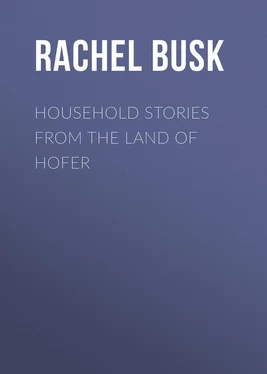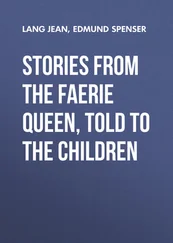Rachel Busk - Household stories from the Land of Hofer
Здесь есть возможность читать онлайн «Rachel Busk - Household stories from the Land of Hofer» — ознакомительный отрывок электронной книги совершенно бесплатно, а после прочтения отрывка купить полную версию. В некоторых случаях можно слушать аудио, скачать через торрент в формате fb2 и присутствует краткое содержание. ISBN: , Жанр: foreign_antique, foreign_prose, на английском языке. Описание произведения, (предисловие) а так же отзывы посетителей доступны на портале библиотеки ЛибКат.
- Название:Household stories from the Land of Hofer
- Автор:
- Жанр:
- Год:неизвестен
- ISBN:http://www.gutenberg.org/ebooks/44746
- Рейтинг книги:3 / 5. Голосов: 1
-
Избранное:Добавить в избранное
- Отзывы:
-
Ваша оценка:
- 60
- 1
- 2
- 3
- 4
- 5
Household stories from the Land of Hofer: краткое содержание, описание и аннотация
Предлагаем к чтению аннотацию, описание, краткое содержание или предисловие (зависит от того, что написал сам автор книги «Household stories from the Land of Hofer»). Если вы не нашли необходимую информацию о книге — напишите в комментариях, мы постараемся отыскать её.
Household stories from the Land of Hofer — читать онлайн ознакомительный отрывок
Ниже представлен текст книги, разбитый по страницам. Система сохранения места последней прочитанной страницы, позволяет с удобством читать онлайн бесплатно книгу «Household stories from the Land of Hofer», без необходимости каждый раз заново искать на чём Вы остановились. Поставьте закладку, и сможете в любой момент перейти на страницу, на которой закончили чтение.
Интервал:
Закладка:
The mineral riches of the country, and the miners occupied in searching for them, are told of as of hidden treasure sought after or revealed, as the case may be, by the Bergweib and the Bergmannlein , or Erdmannlein , the Venedigermannlein and the Hahnenkekerle , the stories of whose strength and generosity, cupidity and spite, are endless; while the mountain echoes are the voices of sprites playfully imitating the sounds of human life.
If the mountains and the forests are thus treated, neither are the lakes and torrents without their share of personification, and many are the legends in which the uses and beauties of the beneficent element are interpreted to be the smiles and the helpful acts of the Wasserfraülein, while the mischances which occur at the water’s edge are ascribed to the Stromkarl and the Brückengeist .
The sudden convulsions of nature to which their soil has been subject from age to age are all charged with retribution for the sins of the people, like the overthrow of Sodom and Gomorrah and the cities of the plain. Castles and forest possessions of wicked rich men are sunk beneath the waters of lakes so that their foundations may never again be set up, and their place be no more found; while a curse pursues those who attempt to dig out the ill-gotten treasure. Villages are recorded to have been swallowed by the earth or buried by the snow-storms when their people have neglected the commandments of God.
This literal adaptation of the admonitions of Holy Writ receives among this people another development in traditions of instances where good deeds done to the poor have been believed to have been actually done to visions of our Lord and of His Saints. Then again, their devout belief in both the irresistible justice and the ineffable love of God convinces them that there must be a place on earth where souls too soiled for heaven, yet not given over to utter reprobation, may wander till the final day of rest. And thus every shepherd, as he keeps his lonely watch upon the Alpine pastures, expects that he may meet the feurige Sennin who broke the Sunday rest; or the Tscheier Friedl who was cruel to the cattle in his charge; or the büssender Hirt who stole the widow’s kine; or the Markegger who removed his neighbour’s landmark; or the Pungga-Mannl who swore a false oath; or the feuriger Verräther who betrayed the mountain pass to the Roman legions.
On the other hand, the heroes and types of the Christian faith are thought of as taking a perpetual interest in the welfare of their struggling brethren: St. Nothburga and St. Isidore watch over the husbandman, and St. Urban over the vinedresser; St. Martin over the mower; St. Martha, St. Sebastian, and St. Rocchus, the drei Pestschutzheiligen 5 5 The three helpers against the plague. There are many churches so called in Tirol.
, are expected to be as potent in their intercession now as when at their prayers, when on earth, plagues were stayed. St. Anthony and St. Florian similarly protect against fire. St. Vigilius, the evangelizer of the country and martyr to his zeal, is still believed to guard its jealously-preserved unity of faith. In return, they receive special veneration: the ordinary dealings of life are regulated by the recurrence of their festivals, and the memory of sacred mysteries is kept in perpetual honour by setting up their tokens in every homestead and every house, in every vineyard and in every field, on every bridge and by every wayside.
It is not surprising that a people so minded have tales to tell of wonderful events which seem to have befallen them, and which take the record of their lives out of the prosaic monotony which rules our own, – tales always bearing a wholesome moral lesson, always showing trust in Providence and faith in the World Unseen, and always told with the charming simplicity which only a logically grounded expectation that events should turn out even so – and no invention or imagination – can give.
A selection of these tales I have put into English dress in the following pages. Though some few of them may be found to bear analogy with similar tales of other German nations, the distinctive qualities of the Tirolese, and the peculiar nature of the scenery amid which they have been conceived, will be found to have stamped them with a character entirely their own.
I think that what I have said is sufficient to give, to such of my readers as did not possess it already, the key to their application, and I need not now append to each a tedious interpretation of the fantastic personages and scenes I shall have to introduce.
It remains only to say a word as to their distribution. The present principality of Tirol is composed of four provinces. North Tirol, South Tirol, Wälsch or Italian Tirol, and Vorarlberg. North and South Tirol have been for long so closely united that, like their language and customs, their mythology has become so intimately intermingled that it scarcely comes within the scope of a work like the present to point out their few divergences or local peculiarities. But those of Wälsch Tirol and Vorarlberg each maintain a much more distinctive character, and I have accordingly marked with a separate heading those which I have gathered thence.
“The Rose-garden of King Lareyn,” however, is not the peculiar property of any one province. Though the three places which claim to occupy its site are all placed in South Tirol, this pretty myth is the common property of the whole country – its chief popular epic – and has even passed into the folklore of other parts of Germany also. It is beside the purpose of the present little work to enter into the controversy which has been raised concerning the authorship. There can be little doubt, however, that it was originally the utterance of some unknown minstrel putting into rough-and-ready rhyme one of the floating myths which symbolized the conflict of the heroes with the powers of evil, so popular in the middle ages. Then poets of more pretensions wrote out, and, as they wrote out, improved the song. Thus there are several different manuscripts of it extant, of between two and three thousand lines each, but not of equal value, for later scribes, in trying to improve, overlaid the simple energy of its diction with a feeble attempt at ornament which only served to damage its force. The name of the Norg-king who is the subject of it, is in these spelt variously, as Lareyn, Luarin, Luarine, &c.; the modern orthography is Laurin. The spelling I have adopted is that of the Chronicon of Aventinus.
I have thought it well to precede the story by some account of the Norg folk and some samples of their legends, that the reader may not come wholly unacquainted with their traditional character to the tale of the discomfiture of the last Norg-king.
NORG MYTHS
The Norgen were a mighty folk in olden time in Tirol. In their span-high bodies resided a power which no child of man, were he ever so stalwart and well-limbed, could resist. But they were also for the most part a peaceable race, and more inclined to assist than to obstruct the industrious inhabitants of the country in their labours; so long as they were treated with respect and deference they seldom interfered with any one. Then they were generally scrupulously honourable, and strict keepers of their word. A service rendered one of them was sure to be repaid a hundredfold. An injury brought a corresponding retribution, and scorn, contempt, or ridicule roused their utmost vengeance; while some there were who entertained a true spirit of mischief, and indulged in wanton tricks which showed their character was not altogether free from malice.
They were most often to be met in lonely paths and unfrequented fastnesses of nature, but a solitary Nörglein could also occasionally stray within the haunts of men, at times asking hospitality at their hands, and at others getting into the bedrooms at night, and teasing the children in their sleep, hence the common proverb —
Читать дальшеИнтервал:
Закладка:
Похожие книги на «Household stories from the Land of Hofer»
Представляем Вашему вниманию похожие книги на «Household stories from the Land of Hofer» списком для выбора. Мы отобрали схожую по названию и смыслу литературу в надежде предоставить читателям больше вариантов отыскать новые, интересные, ещё непрочитанные произведения.
Обсуждение, отзывы о книге «Household stories from the Land of Hofer» и просто собственные мнения читателей. Оставьте ваши комментарии, напишите, что Вы думаете о произведении, его смысле или главных героях. Укажите что конкретно понравилось, а что нет, и почему Вы так считаете.












